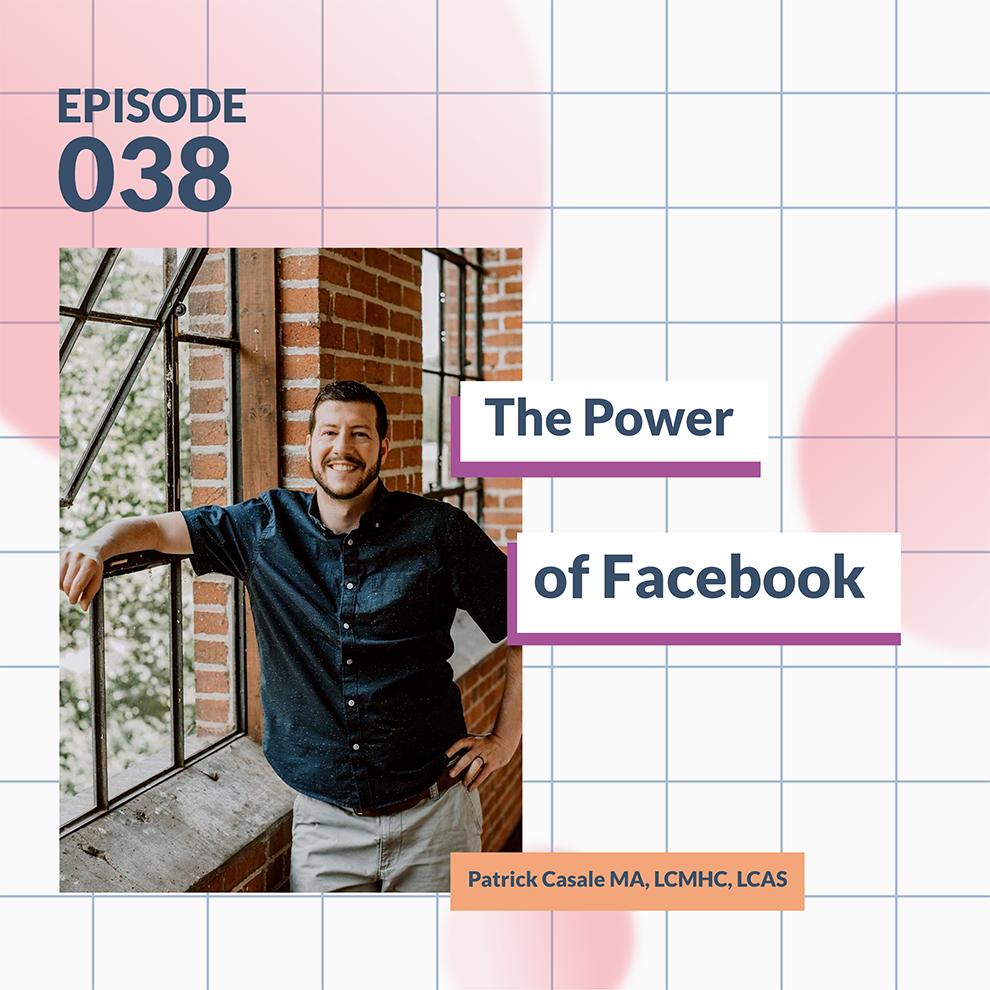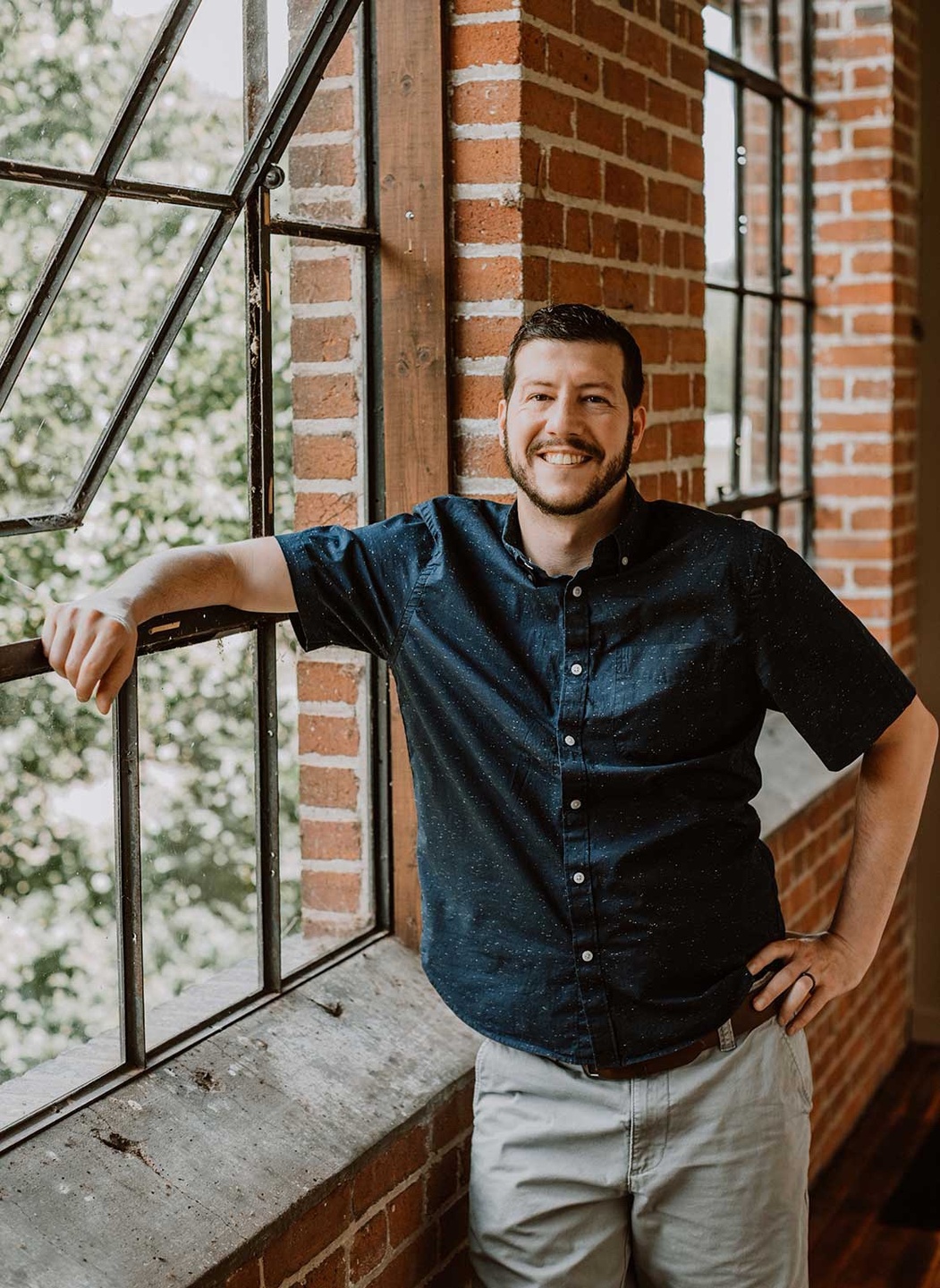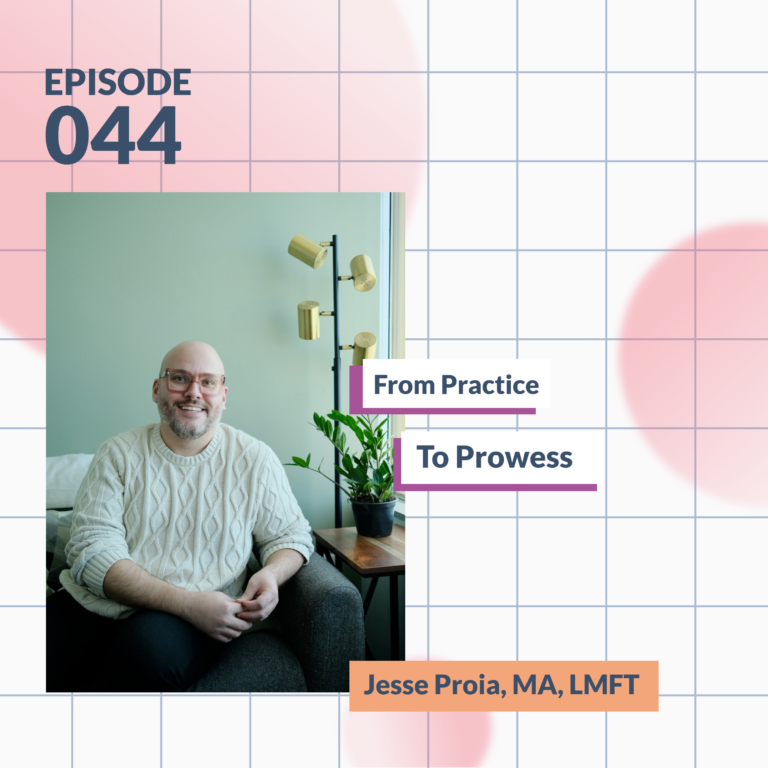Leveraging Facebook for Therapist Success: Insights from a Pro

In this episode, we explore Facebook tips for therapists with guest Patrick Casale MA, LCMHC, LCAS, a group practice owner and private practice coach from Asheville, North Carolina. Patrick brings a wealth of experience, hosting the All Things Private Practice podcast and organizing retreats for therapists, among other initiatives.
During our discussion, Patrick highlights the importance of local Facebook groups for therapists. These groups serve as a vital resource for community building, networking, and gaining referrals. He suggests that if there isn’t an active local group in your area, consider starting one to position yourself as a community leader and local expert. Creating and moderating your own Facebook group is also a strategic digital marketing move to grow your brand identity and connect with your target audience.
We also compared Facebook groups to Instagram, noting that Facebook offers a more intimate community feel, which is crucial for meaningful interactions and networking. Instagram marketing can support brand awareness through visuals and hashtags, while Facebook focuses on community engagement and credibility. Patrick advises therapists to use their personal pages for community engagement and their business pages for essential information and updates.
Content creation on Facebook should reflect your group interactions and align with your social media goals—brand awareness or professional presence. Patrick’s own engagement with his large Facebook group shapes his content strategy for courses and podcast episodes.
In summary, Facebook is a powerful tool for therapists to foster community, establish local connections, and promote their practices. By strategically using local groups, personal and business pages, and creating goal-oriented content, therapists can effectively utilize Facebook for professional growth. Let these insights from Patrick Casale inspire you to harness the potential of Facebook for your private practice. If you’re seeking a marketing guide for therapists or ideas for building a private practice, this episode provides a roadmap toward visibility, wellness, and success. Happy networking!

Patrick Casale is not only a licensed Mental Health & Addiction Therapist and a group practice owner but also a Private Practice Coach & Strategist for therapists. With experience in both the clinical mental health world and the business world, he has helped hundreds of therapists around the United States leave their agencies behind and create their ideal private practices.
Website: allthingspractice.com
Email: [email protected]
Expanding the Power of Facebook: A Deeper Dive into Patrick Casale’s Strategy for Private Practice Growth
In today’s digital world, therapist marketing requires more than just a website. Therefore, strategic social media engagement, especially on Facebook, is vital. It helps therapists grow their practices, attract clients, and build trust in their communities.
Patrick Casale offers a practical framework for integrating Facebook into long-term marketing strategies. While platforms like TikTok and Instagram offer visibility, Facebook fosters genuine connections. Consequently, it’s a powerful tool for mental health professionals who value meaningful interactions over short-term impressions.
The Core Benefits of Facebook for Therapists
Casale highlights Facebook’s role in community-based marketing. Unlike fast-paced platforms, Facebook supports in-depth conversations, long-form content, and relationship-building. These qualities align with the values of therapy and mental wellness.
For instance, therapists can join or moderate Facebook groups to share insights, answer questions, and position themselves as trusted guides. These interactions often lead to referrals and connections with other professionals.
Additionally, being visible in local groups exposes therapists to people who may not seek therapy but engage with wellness content. This visibility helps therapists extend their reach beyond “therapist near me” searches and position themselves as thought leaders in their niche.
Building Thought Leadership Through Group Moderation
Moderating your own Facebook group takes time, but it’s worth the effort. Patrick notes that it lets you set the tone and define discussions, values, and engagement. In doing so, you shape an environment that mirrors your professional identity.
Moreover, creating a safe space for mental health or professional growth questions builds credibility. Over time, group members see you as a trusted resource, offering consistent value.
For therapists in specialties like anxiety, trauma, addiction recovery, or parenting support, Facebook groups generate content naturally. They create community and bring up questions for future blogs, emails, webinars, or workshops.
Turning Conversations into Content
Patrick advises therapists to listen first when engaging in digital marketing. Use your Facebook group to learn what matters to your audience. For example, which posts spark engagement? What questions repeat? What topics lead to in-depth conversations?
This feedback can shape newsletters, podcasts, and events. Additionally, it also guides SEO content marketing, ensuring your blogs use the language your audience searches for.
Consequently, this community-driven strategy creates content that feels relevant and efficient. Instead of brainstorming for hours, therapists can turn discussions into keyword-rich articles that attract and engage clients.
Private Practice Growth Without the High Costs
Many solo practice therapists have limited marketing budgets. Fortunately, Facebook is a perfect solution. It’s free, doesn’t require video editing skills, and doesn’t demand constant trend-chasing.
Patrick’s model focuses on accessibility. You don’t need a large marketing team or spend thousands on ads to build your brand. Instead, by participating in Facebook groups, sharing insights, and building connections, you create a reputation that supports long-term growth.
Once your group is established, you can test paid campaigns or digital products. Think of it as a beta community—your most engaged audience who will offer feedback and become your first clients for new services.
Facebook as a Launchpad for Broader Offerings
Therapists looking to scale with courses, programs, or retreats can use Facebook to launch. Patrick refines ideas, gauges interest, and crowdsources solutions in his group.
This feedback loop ensures your offerings meet real needs, not assumptions. Therefore, by the time you start promoting, your Facebook group already has an audience that trusts you.
Facebook can also help grow mailing lists through freebies in exchange for email sign-ups. This tactic expands your reach and keeps access to your audience beyond the platform’s algorithm.
Action Steps for Therapists Getting Started on Facebook
New to Facebook for business? Start by joining 2-3 local or niche-specific groups. Introduce yourself, follow conversations, and contribute thoughtfully. Once comfortable, consider creating your own group around a topic you care about—stress relief, parenting, or relationships.
Use your personal page for engagement and keep your business page polished. List your services, hours, location, and specialties clearly. Share blog posts, provide insights, and invite members to events or webinars.
Most importantly, stay consistent. The goal isn’t virality—it’s to show up authentically, provide value, and be there when someone needs your services.
Final Thoughts: Marketing with Purpose and Presence
Patrick Casale’s marketing framework for private practice therapists is about more than strategy. It focuses on connection, consistency, and care. When used intentionally, Facebook offers not just visibility but credibility, community, and conversion.
For therapists wanting to grow without burnout or high costs, Facebook provides a free, flexible, and personal way to connect. Whether you’re starting or scaling, Patrick’s insights offer a roadmap to success—one conversation at a time.







